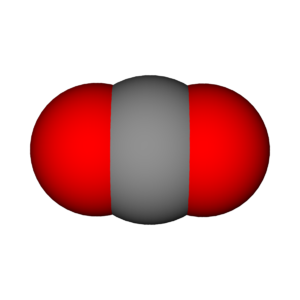Carbon dioxide
Explanationedit
Carbon dioxide (CO2) is a compound made up of one carbon atom covalently double bonded to two oxygen atoms. Though it naturally occurs in trace amounts in the Earth's atmosphere, primary sources of carbon dioxide include combustion of organic compounds like wood, aerobic respiration, and fermentation of sugars. Carbon dioxide plays a vital role in plants and bacteria, where they synthesize carbohydrate from carbon dioxide and water with the help of light energy from the Sun.
Frequently Asked Questionsedit
What is the biological importance of carbon dioxide?edit
In biological energy chemistry, carbon dioxide is important because it represents an "energetically exhausted" carbon molecule, or the end product of energy harvesting of sugars and fats. Briefly, electrons in C-H and C-C bonds (common in sugars and fats) are in relatively high energy orbitals, whereas those in C-O bonds are relatively low energy. The processes of respiration and the electron transport chain 'harvest' high energy electrons and convert their energy to other forms. The rearrangements involved result in products CO2 and H2O--all electrons are 'spent'.
CO2 is also biologically important because it allows sunlight to pass through readily (visible wavelengths of light), but it reflects warmth (infrared wavelengths). More CO2 in the atmosphere, therefore, traps more heat while not decreasing the amount of sunlight energy coming to the planet (greenhouse effect).

